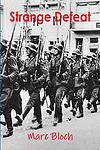The Greatest French "World War II" Books of All Time
Click to learn how this list is calculated.
This list represents a comprehensive and trusted collection of the greatest books. Developed through a specialized algorithm, it brings together 300 'best of' book lists to form a definitive guide to the world's most acclaimed books. For those interested in how these books are chosen, additional details can be found on the rankings page.
Genres
The category of "World War II" books encompasses a wide range of literature that focuses on the events, people, and consequences of the global conflict that took place between 1939 and 1945. This category includes historical accounts, memoirs, biographies, and fiction that explore the political, social, and cultural aspects of the war, as well as its impact on individuals and societies around the world. From the Holocaust to the Pacific theater, from the home front to the battlefields, "World War II" books offer readers a deep understanding of one of the most significant and devastating events in human history.
Countries
Date Range
Reading Statistics
Click the button below to see how many of these books you've read!
Download
If you're interested in downloading this list as a CSV file for use in a spreadsheet application, you can easily do so by clicking the button below. Please note that to ensure a manageable file size and faster download, the CSV will include details for only the first 500 books.
Download-
1. W, or the Memory of Childhood by Georges Perec
"W, or the Memory of Childhood" is a unique blend of autobiographical recollections and fictional narrative. The novel alternates between two storylines: one describing the childhood of a Jewish boy during World War II, and the other detailing a dystopian society on a mysterious island known as "W". The book explores themes of memory, trauma, and the loss of innocence, while also offering a critique of totalitarian regimes. The two narratives gradually converge, revealing the traumatic underpinnings of the protagonist's life and the allegorical nature of "W".
-
2. Suite Française by Irène Némirovsky
"Suite Française" is a two-part novel set during the early years of World War II in France. The first part, "Storm in June," follows a group of Parisians as they flee the Nazi invasion. The second part, "Dolce," shows life in a small French village under German occupation. The novel explores themes of love, loss, and survival, and provides a unique perspective on life in France during the war. The book was written during the war but was not discovered and published until many years later.
-
3. Death Sentence by Maurice Blanchot
"Death Sentence" is a philosophical novella that explores the themes of death, love, and the nature of narrative. The story is divided into two parts, each focusing on a different protagonist who is dealing with the impending death of a loved one. Through their experiences and internal monologues, the novel delves into the complexities of human emotions and the existential dread associated with mortality. The narrative is further complicated by the author's experimental writing style, which challenges traditional storytelling conventions and encourages readers to question their understanding of reality.
-
4. Strange Defeat by Marc Bloch
"Strange Defeat" is a wartime memoir written by a French historian who served as a soldier during World War II. In the book, the author critically analyzes the reasons behind the swift and shocking fall of France to Germany in 1940. The author attributes the defeat to the outdated strategies and poor leadership of the French military and government, and also highlights the social and political issues that plagued France at the time. The book is not only a personal account but also a profound critique of French society and its institutions.
-
5. Silence de la Mer by Vercors
The novel is set during the German occupation of France in World War II and tells the story of an older man and his niece who are forced to host a German officer in their home. The pair respond to their unwanted guest by maintaining a strict silence, refusing to engage in conversation with him. Despite their resistance, the German officer, who is cultured and sophisticated, shares his love of French culture and his hopes for a peaceful Europe. The story explores themes of resistance, occupation, and the power of silence.
-
6. The Kindly One by Jonathan Littell
"The Kindly Ones" is a controversial and provocative novel that follows the life of a former SS officer, who is of French and German descent, during and after World War II. The narrative is a first-person account of the atrocities he committed and witnessed during the Holocaust, presenting a chilling exploration of the human capacity for evil. The story also delves into his post-war life, his struggle with guilt, and his attempts to rationalize his actions. The novel is a profound and disturbing examination of the darkest aspects of human nature, history, and memory.
Reading Statistics
Click the button below to see how many of these books you've read!
Download
If you're interested in downloading this list as a CSV file for use in a spreadsheet application, you can easily do so by clicking the button below. Please note that to ensure a manageable file size and faster download, the CSV will include details for only the first 500 books.
Download




